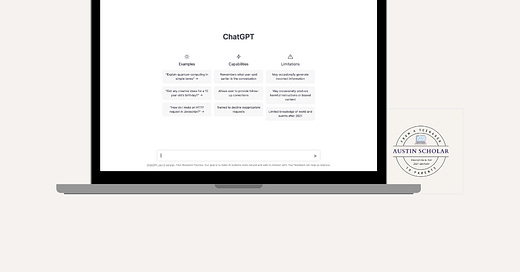Austin Scholar #48: How to Teach Kids to Write Better Than ChatGPT
& How I Learned What Writing Is Supposed to Be
Hey, y'all!
AI is taking over the writing world, and everyone is freaking out.
If AI can write better essays than the average high school student, then what good is learning to write at all? What does ChatGPT mean for education?
Well, AI is only taking over the boring writing. The good writing–the distinctly human stuff–can't be replicated by a robot.
But I'm getting ahead of myself.
This week from Austin Scholar...
Austin’s Anecdote: How I Learned What Writing Is Supposed to Be
How to Help Kids Write Better Than ChatGPT
Scholar’s Sources: My Favorite Threads on Utilizing ChatGPT’s Potential
It’s been a crazy week. Steven Strogatz, the author of my actual favorite book (Infinite Powers), liked one of my tweets. It was probably the best day of my life. I’ve been driving a lot, as well (getting on highways is not something my mom enjoys watching me do).
I've also been going through a Twitter course and have been posting on Twitter multiple times a day. If you haven't seen it yet, you can check that out here.
Austin’s Anecdote: How I Learned What Writing Is Supposed to Be
I've mastered the five-paragraph, third-person observational essay.
I know the sentence structure required, number of SAT words needed, and types of arguments that will get me an A. Last year, before the AP Language and Composition exam, I created and memorized super specific templates for every essay (complete with pre-written sentences, prompting words, and examples) so I would only need to fill in the question specific-details on exam-day.
I got a five.
But let me be completely clear: no one would actually want to read those essays.
They're too boring, academic, and formulaic for people to actually enjoy reading them.
Besides, anyone could've written those essays. To those AP graders, I was just another faceless, nameless student who happened to write something of high quality. Or even worse–I was just another essay on rhetorical devices.
That's the problem with educational writing. There's nothing distinctive about it.
To get a good grade, I had to write in a specific form in a specific tone with specific arguments.
But in all honesty, that's not good writing.
Good writing comes alive with personality–you know who wrote that sentence.
That's something I really struggled with when I first started writing these newsletters. I was stuck in a "school mindset." I tried to use fancy words and keep my arguments objective.
But that made my writing pretty bland. The "school mindset" really hurt my writing. I got a lot feedback from my parents and readers on how my writing wasn't personal enough–but I really didn't understand why.
My writing would've gotten me a good grade, so why don't people like it?
And then, during a Write of Passage live session, David Perell edited an article about pancakes.
The first part of the essay was a super informational recipe on how to make healthy, vegan pancakes. I suppose a certain audience would enjoy it, but as a non-vegan, I'm not a part of it.
But the second half of the essay was about the author's interactions with her kids when she makes the pancakes. I loved it. This part of the essay was relatable, heartwarming, and funny–even to someone who doesn't care about vegan pancakes.
It clicked.
It's truly the personality that makes writing sing. The arguments and evidence might be the rhythm, but it's the stories that are the melodies.
And so, I had to unlearn my habits of removing myself from my writing. Instead, I had to immerse myself in it.
I practiced being vulnerable and baring my soul and making jokes.
I learned to put myself on the page.
How to Help Kids Write Better Than ChatGPT
The whole world is abuzz talking about ChatGPT: the revolutionary chatbot that can explain complex topics, create Twitter hooks, and write an essay on any topic that can’t be flagged for plagiarism.
It’s true. ChatGPT provides an insanely easy way for students to cheat–without getting caught. I have no doubt that there are thousands of kids who have already turned in A+ papers without writing a single word–and no one could tell.
So, what does that mean for writing, and education in general?
If ChatGPT can write an essay on Shakespeare indistinguishable from the best student in English class, what’s the point?
In spite of its real-world irrelevance, I do think that there are benefits to the five-paragraph essay. Kids learn how to structure arguments, learn basic grammar and word choice, and begin exploring nuances in writing.
The classic essay is a great baseline for students to learn how to write–but it shouldn’t be the end goal. ChatGPT proves that just writing these essays isn’t enough. It’s not valuable anymore.
If teenagers don’t improve past the five-paragraph essay, their writing skills are essentially useless in the new world of AI and ChatGPT.
So, how do we fix this?
We have to change how we teach writing.



